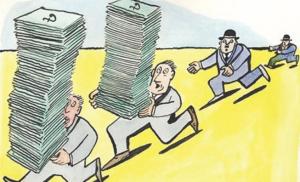Published in The Daily Star on Tuesday, 19 April 2016
Make the budget work
Syed Mansur Hashim
 The Centre for Policy Dialogue (CPD) has recently made recommendations on the upcoming budget in the unveiling of ‘State of Bangladesh Economy in 2015-16)’. In what was termed as ‘qualitative changes’ to make the budget ‘realistic’, the leading think-tank representatives outlined a number of areas that had undermined public confidence in the annual budgets that are approved in parliament every year. One of the key issues that plague every budget is its inflated size, which is invariably larger than the preceding one. The over-enthusiasm of some planners is what may be termed by some analysts as unrealistic goals, which are then trimmed down in successive revisions, as there is a failure to implement the annual development plan (ADP) for a variety of reasons, of which failure to generate requisite revenue is one.
The Centre for Policy Dialogue (CPD) has recently made recommendations on the upcoming budget in the unveiling of ‘State of Bangladesh Economy in 2015-16)’. In what was termed as ‘qualitative changes’ to make the budget ‘realistic’, the leading think-tank representatives outlined a number of areas that had undermined public confidence in the annual budgets that are approved in parliament every year. One of the key issues that plague every budget is its inflated size, which is invariably larger than the preceding one. The over-enthusiasm of some planners is what may be termed by some analysts as unrealistic goals, which are then trimmed down in successive revisions, as there is a failure to implement the annual development plan (ADP) for a variety of reasons, of which failure to generate requisite revenue is one.
As taxation remains the principal source of revenue for the government, it has been recommended that the income tax regime be revisited. We understand from the CPD presentation that our income tax collection has hit a 14-year low. That means there are loopholes in the system and tax evasion is a serious problem in the country. Recently Bangladesh was flagged by the Asia Pacific Group on Money Laundering (APG) in a draft assessment report that put Bangladesh as a country that is ‘risky’, unless constructive steps were taken to tackle money laundering. That some US$55.88 billion had been siphoned off from the country over the last decade shows that we have a serious problem with illicit flight of funds. Is it really any wonder that so little tax is being paid? Besides this, it makes sense to widen the taxation bracket so that the spread is widened and genuine tax payers are not overburdened.
There appears to be some contention over provisional growth of the economy and the actual growth. Stress has been put on the formation of a statistical commission that would assess macroeconomic indicators and make available to policymakers as to which way the economy is going. Getting back to revenue generation, that we have serious shortfall in generating requisite revenue is a reality. The CPD presentation shows that there is a tendency to overinflate revenue figures in the budget. And as budgetary allocations to the various ministries and departments are based on projected revenue collection, it is only natural that these individual budgets are cut later on to match realities on the ground. This is a practice that has been going on for years (under successive governments) and is hardly a satisfactory state of affairs.
That the government has been unable to stop the flow of scams in the financial sector is public knowledge. Despite high profile committees and their recommendations, successive state-owned banks continue to experience pilferage. The constant pumping in of public funds to the tune of thousands of crores of Takas to keep such unhealthy financial institutions in business, whilst apparently failing to plug holes in the system that allow for pilferage to take place in the first place, demands a change in the manner we do business. It would make sense to place the detailed financial accounts of state-owned entities in the public domain, because it is not simply the government-controlled banks that suffer from ambiguity, the same can be said of practically all corporations and state-owned assets including the utility companies and other entities and organisations that fall under the public sector.
Such transparency would go a long way to prevent graft and bring about some form of accountability, which sadly till date, has been largely missing. For instance, we have no idea about the books of accounts of the Bangladesh Petroleum Corporation (BPC), the entity that ensures the import of fuels to the country. We have witnessed the war of words between the ministry of finance and BPC recently about how much money is owed by the latter to the government. That problem was sorted out later on, but why would such massive pressure have to be brought on any State-owned entity to admit that they were in the green if the books of account were in fact public knowledge? Indeed going by what has been reported in the press, an investigation carried out by the national board of revenue (NBR) found a number of state-owned enterprises had failed to pay value added taxes. Again this matter was resolved after much wrangling.
At the end of the day, we are confronted with the various problems associated with revenue collection. And hence, it is hoped that when policymakers sit down to balance the budget, realistic revenue collection should be taken into account before declaring a budget that in all likelihood will have to be trimmed later on. This makes the most important policy document in the country (and its formulation) the butt of jokes, which we are sure, does not sit well with either the government or the people.



